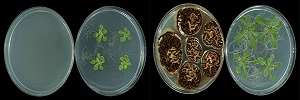A wide range of microorganisms, including fungi and phytopathogenic bacteria, are capable of emitting volatile compounds which boost plant growth and flowering, and in accumulating up reserves as demonstrated in a study led by scientific researchers at Navarra's Institute of Agro biotechnology, in northern Spain, which is a mixed centre shared between Spain's National Research Council (CSIC), the Public University of Navarra, and the Regional Government of Navarra.

The discovery could have applications in sustainably improving crop yields as an alternative to conventional agrochemicals and in encouraging the interaction between plants. In addition, it will help in reducing the number of strains of beneficial micro-organisms. The results appear in two articles in the magazines Plant Cell and Environment, and Plant Physiology.
"This study puts forward for the first time the 'bad little critters, beneficial workers' concept, according to which non-beneficial microorganisms constitute an untapped and favourable pool of bio-stimulants with a high biotechnological potential", explains Javier Pozueta, CSIC investigator at the Institute of Agro-biotechnology.
Furthermore, the articles gather the results from projects carried out into biochemical and molecular mechanisms involved in the 'positive' response in plants to volatile compounds emitted by microorganisms which, from an anthropocentric standpoint, are considered to be 'negative' or 'non-beneficial'.